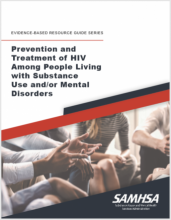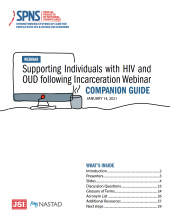
Opioid agonist treatment (OAT) is the provision of medications (methadone and buprenorphine) that activate the opioid receptors to prevent withdrawal and reduce cravings for opioids.



Opioid agonist treatment (OAT) is the provision of medications (methadone and buprenorphine) that activate the opioid receptors to prevent withdrawal and reduce cravings for opioids.
This publication, part of SAMHSA's Evidence Based Resource Guide series, addresses the co-occurrence of HIV and mental illness and/or SUD.
This article describes how the HIV testing window period is a challenge related to prescribing PrEP for people who inject drugs, and discusses current approaches and how data are needed to help guide best practices.
This document contains slides for the September 2020 Models of Integrated Care for HIV and Opioid Use Disorder: Considerations for Community and Clinical Settings webinar.
This virtual session summary describes key takeaways from the August 2020 Let's Talk about SSPs as Essential Services conversation.
Developed as part of the Strengthening Systems of Care for People with HIV and Opioid Use Disorder project, this document contains brief descriptions of federal policy and systems changes due to coronavirus 2019 (COVID-19) that relate to the HIV and substance use systems of care, along w
This article includes a case report example from Boston Medical Center focused on prescribing buprenorphine via telehealth, an approach made possible by regulatory changes during the COVID-19 pandemic.
To address the infectious disease consequences of the opioid crisis in the U.S., a public workshop titled Integrating Infectious Disease Considerations with Response to the Opioid Epidemic was convened on March 12 and 13, 2018, by the National Academies of Sciences, Engineering, and Medicine.
This ready-to-use training package is designed to provide HIV clinicians (including physicians, dentists, nurses, therapists and social workers, and counselors, specialists, and case managers) with an overview of the challenges and strategies for change in working with individuals living with HIV
This ready-to-use training package is designed to provide HIV clinicians (including physicians, dentists, nurses, therapists and social workers, and counselors, specialists, and case managers) with an overview of the opioid crisis and HIV.